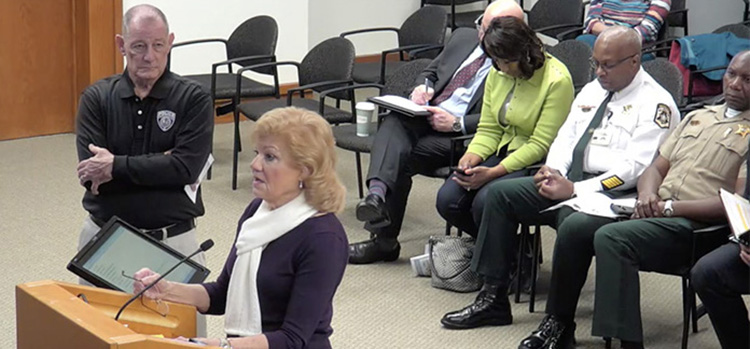Commissioners battle over raises, procedure

DAVE AND DIANA ROCHESTER ADDRESS TOWN BOARD
March 6. By Dave Yochum. Members of the Town Board want what’s best for Cornelius, but they come at it from different directions. It was perhaps never more apparent than at their meeting Monday night.
The meeting began with Diana and Dave Rochester—ordinary retirees who live in Heron Harbor—addressing the Town Board and Mayor about low salaries are in the Cornelius Police Dept. and how—out of literally hundreds of officers who have left the force over the years—only three or four actually retired.
Cornelius officers, about five since January, are being recruited by forces all around us, from Davidson and Huntersville, to Charlotte and private security. CPD rookies are out on domestic calls, frequently the most dangerous and volatile situations even in quiet Cornelius neighborhoods.
“You can’t recruit someone when everybody else is offering more,” Diana said.
Cornelius competes against Huntersville and Davidson where police officers receive probationary salary increases of 5 percent. In Cornelius the probationary bump is zero. There is a $5,000 a year salary shortfall between Cornelius officers and Davidson, $7,000 vs. Huntersville.
“We have a problem with retention,” the Rochesters said.
And then the town meeting got down to business like new residential developments, a sales tax increase and a Salary and Benefits Study conducted by an expert citizens committee.
Raises make sense
The board clearly came down on the side of raises for not just police officers, but staffers in Town Hall ranging from accountants in finance to planners.

GRANT
Thirty-nine percent of Cornelius salary ranges are below market, according to the study. More than two-thirds of current employees are paid below market, while 42 percent have less than five years of experience.
Town Manager Andrew Grant said other towns are stepping up their recruiting efforts. Staff “morale regarding pay is an increasing concern,” he said.
Commissioner Dave Gilroy seemed to disagree that the cause of all the turnover had to do with pay. He said turnover was more a matter of natural career projection, opportunities elsewhere and in some cases personnel issues both in terms of poor management by their superiors or poor performance on the part of the employee.

GILROY
Then he started to read a report line for line based on phone calls to former employees.
That’s when a member of the citizen-driven salary and benefits committee stood up and walked silently out of the town meeting never to return.
It was the first of a number of dramatic moments.
Is there a personnel crisis?
Gilroy continued to read his survey, explaining that only 4.5 percent of former employees said compensation was the most important factor around their departure. Forty-one percent were not compensation-related, while 22 percent retired or were recruited because of a major career advancement.
“It’s impossible to say there is some kind of emergency” overall in Cornelius municipal staffing, Gilroy said, “but yes, there is something in the police department.”

BILODEAU
Less than one cent on the tax rate would fund the roughly $419,000 needed to fund raises for town employees including police according to Andrew Grant, the town manager. Raises, depending on when they are implemented, could cost taxpayers $119,000 if they’re implemented this month, during this fiscal year.
The new fiscal year starts July 1, a key date in the world of municipal finance.
Commissioner Denis Bilodeau said “the request that Andrew is making is conservative.” It would come during the third quarter of this fiscal year’s budget, with April, May and June being the fourth quarter.
The current budget was approved in June of last year.
Timing: Wait or act?
Gilroy said we’ve “never done this kind of a change like this in the middle of the budget cycle. Unprecedented.”

MILTICH
Bilodeau said: “I wouldn’t get hung up on history.”
Last year firefighters turned out en masse at the town board meeting during budget talks and landed a $2 an hour raise to $15 an hour. It cost about $120,000 a year in a $23.4 million municipal budget.
“I can see doing something very similar for the police this year,” Gilroy said, in a nod to Bilodeau.
Bilodeau said “we have good data,” thanks to the citizen committee, which was comprised of personnel experts.
“I don’t know what else we’re going to know,” Bilodeau said.
Manager Grant said this is not something he would normally ask mid-year “if it were not for the issues that we are facing.”
Here’s where the two opposing viewpoints split in angry fashion.

NAAS
Raising salaries now—as 2019-2020 budget noodling get underway March 7 at the Graylyn conference center in Winston-Salem—would encumber next year’s finances $300,000 to $420,000.
Indignant commissioner
Commissioner Kurt Naas indignantly pointed out that Bilodeau and Commissioner Michael Miltich appeared to be ready to “encumber” the new budget $300,000 to $420,000 without having “had a single discussion” on next year’s budget.
“We would be derelict to vote on any of these options without knowing what the 2020 budget is. We need to have the 2020 budget discussion” before deciding on raises right now, Naas said.
Bilodeau said there’s no more important issue than public safety but “we tend to overlook our finest asset, our staff.”

ROSS
Naas and Gilroy, whose thinking focuses on pocketbooks and process, essentially said the board has no business voting on encumbering next year’s budget before looking at the entire financial picture which includes ratables and tax income.
Miltich, a physician, said look at the data. “It is clear we are hemorrhaging staff. We have to do something now, right away,” he said.
Washam said there is real data in “front of our face.”
Naas said he was not actually suggesting a “no” vote on the concept.
Miltich wanted pay increases across the board, not just police.
Commissioner Thurman Ross citing low morale, said it was “critical” to do something.

WASHAM
“We’re at the budget retreat Thursday, we can vote on this Friday,” Gilroy said, wanting an explanation from Grant as to why he was pushing raises right now.
Washam stepped in and said the town manager had merely brought out the data that came from the citizen salary and benefits committee.
Mayors have no vote in the Cornelius form of government except to break a tie. Washam used his leadership position to cut off discussion—it seemed endless at this point—and call for a vote. “We have five members on this board,” he said.
Bilodeau said he would like to make a motion. “We can’t kick the can down the road…this is less than a penny,” he said. “This is the highest priority we have to look at,” he said.
Raises begin in April
The motion was crafted and re-crafted to give raises starting April 1.
The motion to give raises across departments passed 3-2 with Gilroy and Naas casting the no votes.
Naas said it was the “most irresponsible vote we’ve made since I’ve been here.”
Washam told Naas: “That’s your opinion, commissioner. I think it’s the most responsible we’ve made.”
Gilroy laughed scornfully and the meeting ended.
Naas stormed out and left his commissioners behind.
Police officers came up to the mayor and shook his hand, although Bilodeau, Miltich and Ross did the voting.
Gilroy told this reporter after the meeting he is “supportive of a substantial compensation increase in the police department, but there is a right way of implementing that policy through ordinary budget planning.”
So, it looks like there was agreement around pay raises, it was the timing and the process that was open to debate.
You can watch the meeting here https://boxcast.tv/channel/ygjmmmgngejyj0lyo3ja
Click here to read the retreat agenda: https://cornelius.novusagenda.com/agendapublic/MeetingView.aspx?MeetingID=1170&MinutesMeetingID=-1&doctype=Agenda
One Comment
Comments are closed.





Cornelius needs to learn now what EVERYONE from high-tax northern states already know, pay increases in government position are not a key factor in retention and, those “little” increases, lead to exponential cost increases over time with insurance and retirement!!! The “one-penny” argument is where it all starts and those “pennies” add up very quickly.